外研版七年级下册Module 9 Life history Unit 3 Language in use练习(含解析)
文档属性
| 名称 | 外研版七年级下册Module 9 Life history Unit 3 Language in use练习(含解析) |
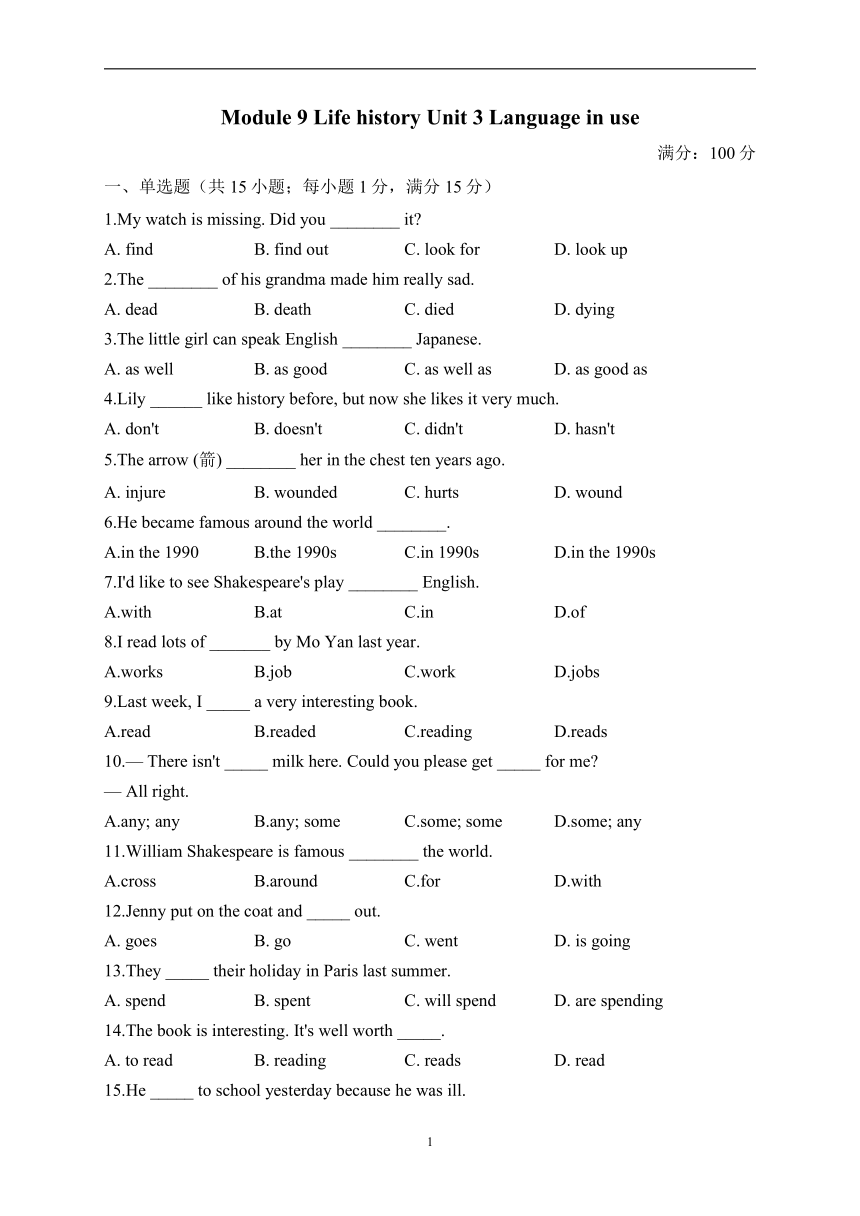
|
|
| 格式 | docx | ||
| 文件大小 | 30.7KB | ||
| 资源类型 | 教案 | ||
| 版本资源 | 外研版 | ||
| 科目 | 英语 | ||
| 更新时间 | 2023-09-13 00:00:00 | ||
图片预览

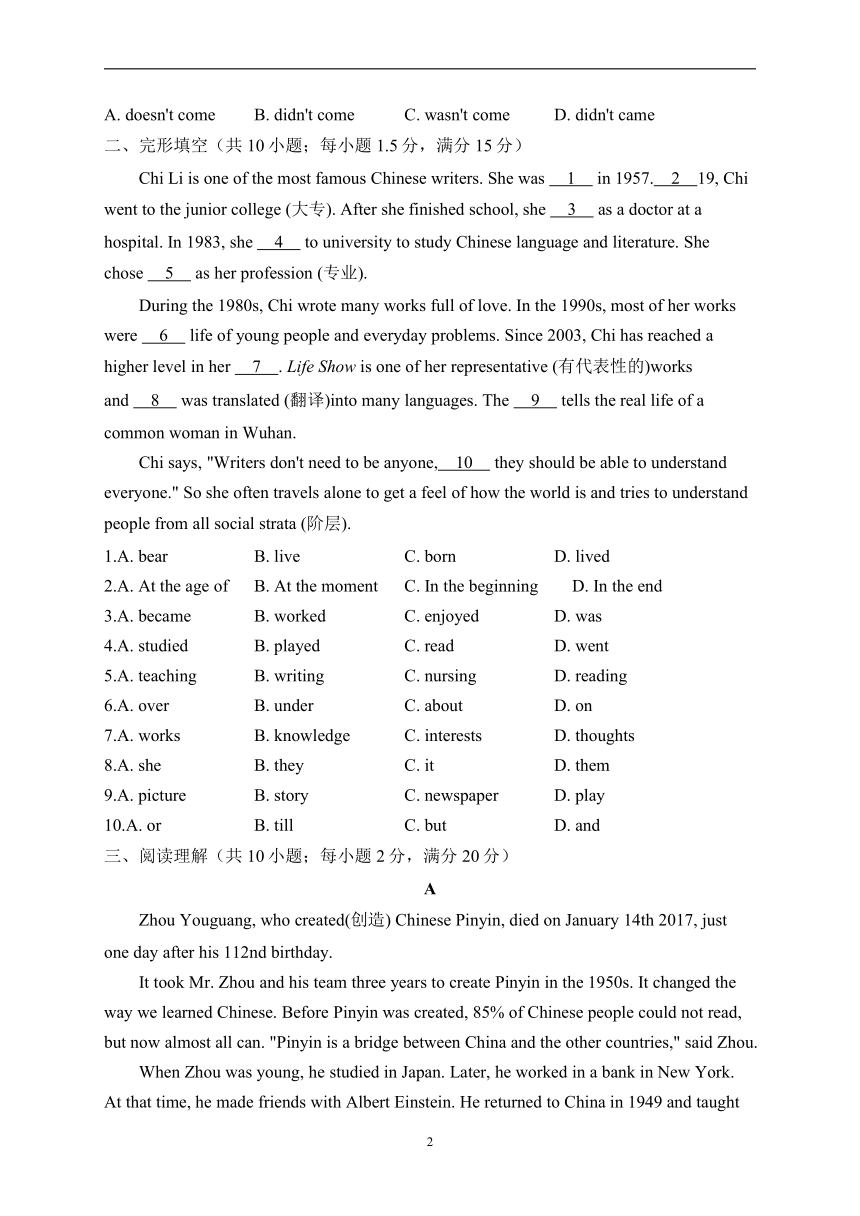
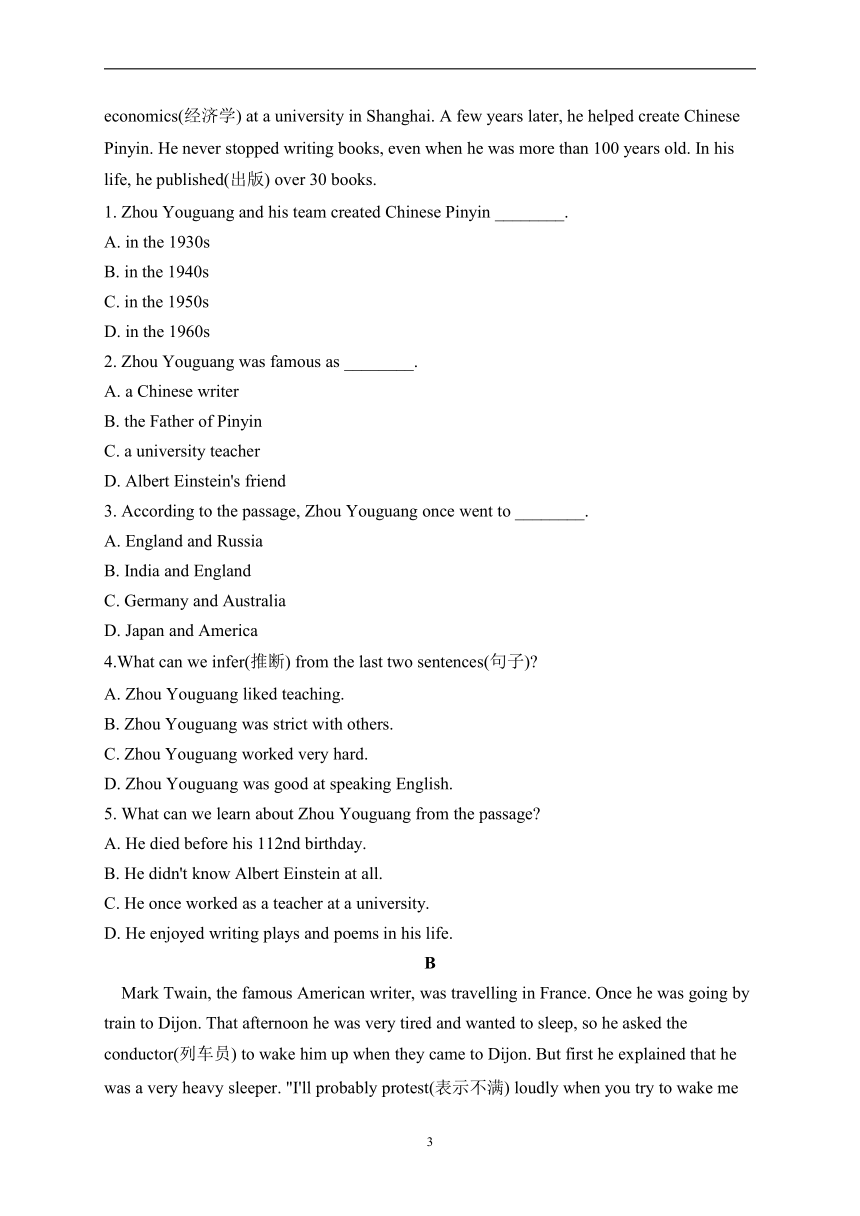
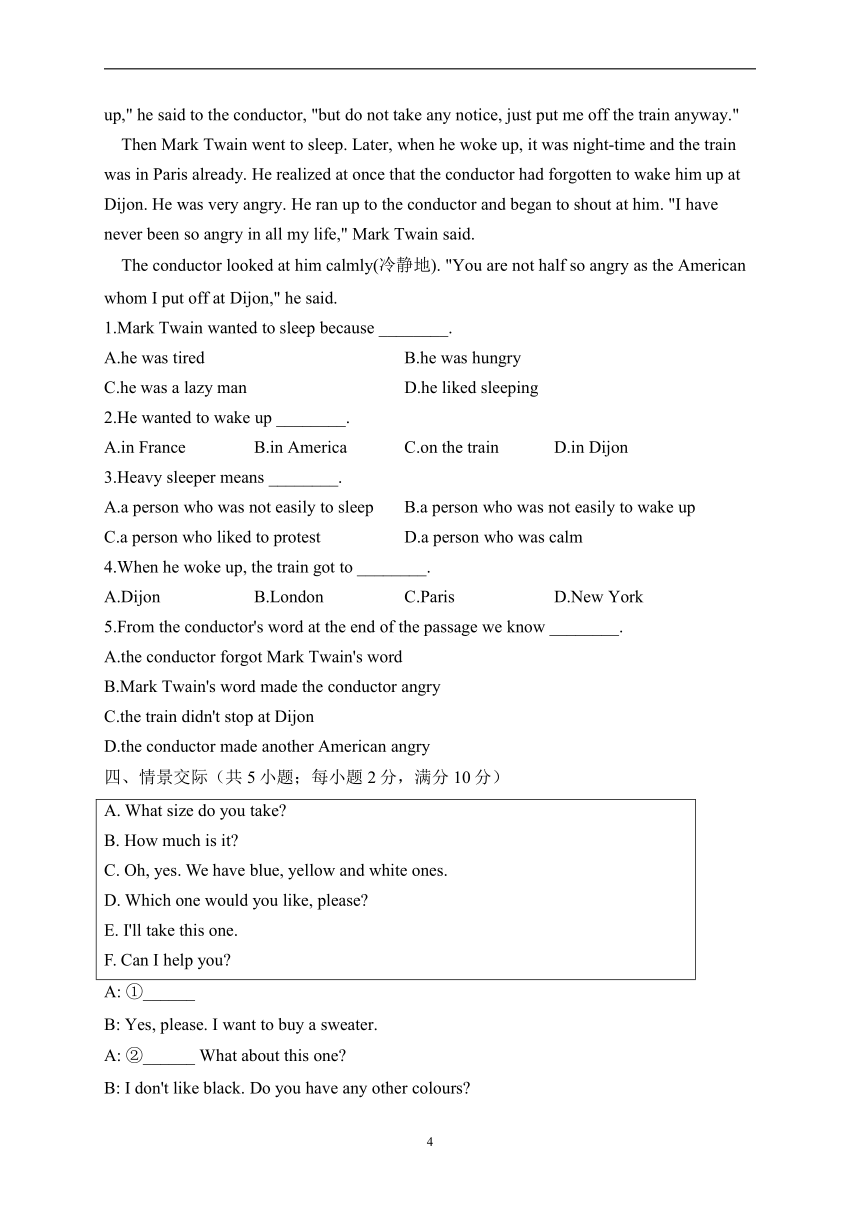
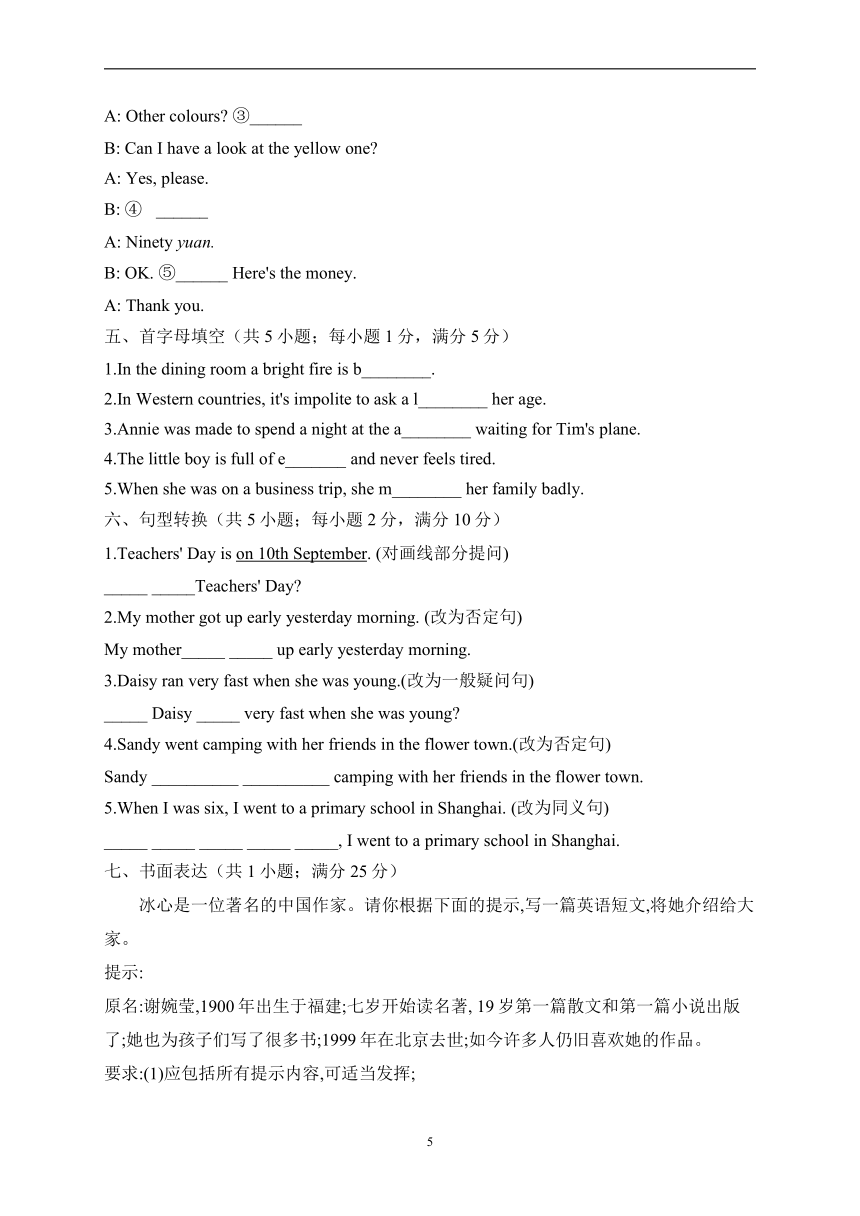
文档简介
Module 9 Life history Unit 3 Language in use
满分:100分
一、单选题(共15小题;每小题1分,满分15分)
1.My watch is missing. Did you ________ it
A. find B. find out C. look for D. look up
2.The ________ of his grandma made him really sad.
A. dead B. death C. died D. dying
3.The little girl can speak English ________ Japanese.
A. as well B. as good C. as well as D. as good as
4.Lily ______ like history before, but now she likes it very much.
A. don't B. doesn't C. didn't D. hasn't
5.The arrow (箭) ________ her in the chest ten years ago.
A. injure B. wounded C. hurts D. wound
6.He became famous around the world ________.
A.in the 1990 B.the 1990s C.in 1990s D.in the 1990s
7.I'd like to see Shakespeare's play ________ English.
A.with B.at C.in D.of
8.I read lots of _______ by Mo Yan last year.
A.works B.job C.work D.jobs
9.Last week, I _____ a very interesting book.
A.read B.readed C.reading D.reads
10.— There isn't _____ milk here. Could you please get _____ for me
— All right.
A.any; any B.any; some C.some; some D.some; any
11.William Shakespeare is famous ________ the world.
A.cross B.around C.for D.with
12.Jenny put on the coat and _____ out.
A. goes B. go C. went D. is going
13.They _____ their holiday in Paris last summer.
A. spend B. spent C. will spend D. are spending
14.The book is interesting. It's well worth _____.
A. to read B. reading C. reads D. read
15.He _____ to school yesterday because he was ill.
A. doesn't come B. didn't come C. wasn't come D. didn't came
二、完形填空(共10小题;每小题1.5分,满分15分)
Chi Li is one of the most famous Chinese writers. She was 1 in 1957. 2 19, Chi went to the junior college (大专). After she finished school, she 3 as a doctor at a hospital. In 1983, she 4 to university to study Chinese language and literature. She chose 5 as her profession (专业).
During the 1980s, Chi wrote many works full of love. In the 1990s, most of her works were 6 life of young people and everyday problems. Since 2003, Chi has reached a higher level in her 7 . Life Show is one of her representative (有代表性的)works and 8 was translated (翻译)into many languages. The 9 tells the real life of a common woman in Wuhan.
Chi says, "Writers don't need to be anyone, 10 they should be able to understand everyone." So she often travels alone to get a feel of how the world is and tries to understand people from all social strata (阶层).
1.A. bear B. live C. born D. lived
2.A. At the age of B. At the moment C. In the beginning D. In the end
3.A. became B. worked C. enjoyed D. was
4.A. studied B. played C. read D. went
5.A. teaching B. writing C. nursing D. reading
6.A. over B. under C. about D. on
7.A. works B. knowledge C. interests D. thoughts
8.A. she B. they C. it D. them
9.A. picture B. story C. newspaper D. play
10.A. or B. till C. but D. and
三、阅读理解(共10小题;每小题2分,满分20分)
A
Zhou Youguang, who created(创造) Chinese Pinyin, died on January 14th 2017, just one day after his 112nd birthday.
It took Mr. Zhou and his team three years to create Pinyin in the 1950s. It changed the way we learned Chinese. Before Pinyin was created, 85% of Chinese people could not read, but now almost all can. "Pinyin is a bridge between China and the other countries," said Zhou.
When Zhou was young, he studied in Japan. Later, he worked in a bank in New York. At that time, he made friends with Albert Einstein. He returned to China in 1949 and taught economics(经济学) at a university in Shanghai. A few years later, he helped create Chinese Pinyin. He never stopped writing books, even when he was more than 100 years old. In his life, he published(出版) over 30 books.
1. Zhou Youguang and his team created Chinese Pinyin ________.
A. in the 1930s
B. in the 1940s
C. in the 1950s
D. in the 1960s
2. Zhou Youguang was famous as ________.
A. a Chinese writer
B. the Father of Pinyin
C. a university teacher
D. Albert Einstein's friend
3. According to the passage, Zhou Youguang once went to ________.
A. England and Russia
B. India and England
C. Germany and Australia
D. Japan and America
4.What can we infer(推断) from the last two sentences(句子)
A. Zhou Youguang liked teaching.
B. Zhou Youguang was strict with others.
C. Zhou Youguang worked very hard.
D. Zhou Youguang was good at speaking English.
5. What can we learn about Zhou Youguang from the passage
A. He died before his 112nd birthday.
B. He didn't know Albert Einstein at all.
C. He once worked as a teacher at a university.
D. He enjoyed writing plays and poems in his life.
B
Mark Twain, the famous American writer, was travelling in France. Once he was going by train to Dijon. That afternoon he was very tired and wanted to sleep, so he asked the conductor(列车员) to wake him up when they came to Dijon. But first he explained that he was a very heavy sleeper. "I'll probably protest(表示不满) loudly when you try to wake me up," he said to the conductor, "but do not take any notice, just put me off the train anyway."
Then Mark Twain went to sleep. Later, when he woke up, it was night-time and the train was in Paris already. He realized at once that the conductor had forgotten to wake him up at Dijon. He was very angry. He ran up to the conductor and began to shout at him. "I have never been so angry in all my life," Mark Twain said.
The conductor looked at him calmly(冷静地). "You are not half so angry as the American whom I put off at Dijon," he said.
1.Mark Twain wanted to sleep because ________.
A.he was tired B.he was hungry
C.he was a lazy man D.he liked sleeping
2.He wanted to wake up ________.
A.in France B.in America C.on the train D.in Dijon
3.Heavy sleeper means ________.
A.a person who was not easily to sleep B.a person who was not easily to wake up
C.a person who liked to protest D.a person who was calm
4.When he woke up, the train got to ________.
A.Dijon B.London C.Paris D.New York
5.From the conductor's word at the end of the passage we know ________.
A.the conductor forgot Mark Twain's word
B.Mark Twain's word made the conductor angry
C.the train didn't stop at Dijon
D.the conductor made another American angry
四、情景交际(共5小题;每小题2分,满分10分)
A. What size do you take B. How much is it C. Oh, yes. We have blue, yellow and white ones. D. Which one would you like, please E. I'll take this one. F. Can I help you
A: ①______
B: Yes, please. I want to buy a sweater.
A: ②______ What about this one
B: I don't like black. Do you have any other colours
A: Other colours ③______
B: Can I have a look at the yellow one
A: Yes, please.
B: ④ ______
A: Ninety yuan.
B: OK. ⑤______ Here's the money.
A: Thank you.
五、首字母填空(共5小题;每小题1分,满分5分)
1.In the dining room a bright fire is b________.
2.In Western countries, it's impolite to ask a l________ her age.
3.Annie was made to spend a night at the a________ waiting for Tim's plane.
4.The little boy is full of e_______ and never feels tired.
5.When she was on a business trip, she m________ her family badly.
六、句型转换(共5小题;每小题2分,满分10分)
1.Teachers' Day is on 10th September. (对画线部分提问)
_____ _____Teachers' Day
2.My mother got up early yesterday morning. (改为否定句)
My mother_____ _____ up early yesterday morning.
3.Daisy ran very fast when she was young.(改为一般疑问句)
_____ Daisy _____ very fast when she was young
4.Sandy went camping with her friends in the flower town.(改为否定句)
Sandy __________ __________ camping with her friends in the flower town.
5.When I was six, I went to a primary school in Shanghai. (改为同义句)
_____ _____ _____ _____ _____, I went to a primary school in Shanghai.
七、书面表达(共1小题;满分25分)
冰心是一位著名的中国作家。请你根据下面的提示,写一篇英语短文,将她介绍给大家。
提示:
原名:谢婉莹,1900年出生于福建;七岁开始读名著, 19岁第一篇散文和第一篇小说出版了;她也为孩子们写了很多书;1999年在北京去世;如今许多人仍旧喜欢她的作品。
要求:(1)应包括所有提示内容,可适当发挥;
(2)词数不少于70。
参考词汇:散文prose; 小说novel; 出版come out
____________________________________________________________________________________________________________________________________________________________________________________________________________________________________________________________________________________________________________
答案以及解析
一、单选题
1.答案:A
解析:句意:我的表不见了。你找到了吗?考查动词及动词短语词义辨析。find找到,强调"找"的结果;find out表示通过理解、分析、思考、询问等"弄清楚""查明"一件事情,其后的宾语常常是某个情况、事实;look for寻找,强调"寻找"这一动作;look up (在词典、参考书中)查阅。根据"My watch is missing."可知,这里指你找到没有,强调结果。故选A。
2.答案:B
解析:句意:祖母的死让他真的很难过。考查词义辨析。dead无生命的,形容词;death死,名词;died死,动词过去式;dying垂死的,形容词。根据"The … of his grandma"可知,这是名词所有格结构,名词+of+名词,故此空应填名词。故选B。
3.答案:C
解析:句意:这个小女孩会说英语和日语。考查短语辨析。as well也;as good后缺少另一个as;as well as和,还有;像……一样好;as good as和……一样好。根据句意可知,该空连接English 和Japanese,应用as well as。故选C。
4.答案:C
解析:句意:莉莉以前不喜欢历史,但是现在她很喜欢。考查时态。根据时间标志词before,可知用一般过去时;又因为此处要用助动词构成否定,所以用didn't。故选C。
5.答案:B
解析:句意:十年前那支箭射中了她的胸部。考查动词辨析。injure伤害;wounded (用武器) 伤害,过去式;hurts伤害;wound (用武器) 伤害。wound指在暴力、战争等中受伤,符合句意。由ten years ago可知为一般过去时。故选B。
6.答案:D
解析:句意:在上世纪90年代他在全世界出名了。考查介词短语。表示"在……世纪……年代",应用介词in,短语中必须有定冠词the,年代后加s。因此"二十世纪九十年代"应该是in the 1990s。故选D。
7.答案:C
解析:句意:我想看莎士比亚的英文戏剧。考查介词辨析。with用,后面常跟工具;at在具体的时间点或地点;in在……里面;用……材料;用某种语言;of……的。空后English是语言,应用介词in。故选C。
8.答案:A
解析:句意:去年我读了很多莫言的作品。考查名词辨析。works作品,可数名词复数形式;job工作,可数名词;work工作,不可数名词;jobs是复数形式。莫言是著名的作家,因此这里表示"阅读了他的作品"。故选A。
9.答案:A
解析:句意:上周,我读了一本很有趣的书。考查一般过去时。根据"Last week"可知,该句用一般过去时,谓语用动词的过去式,"read"的过去式是"read"。故选A。
10.答案:B
解析:句意:——这儿没有牛奶了,请你为我弄一些好吗 any用于否定句;some用于肯定句或请求对方并希望得到肯定回答的一般疑问句中。第一句是否定句,该空用any,第二句是希望得到对方的肯定回答,这里用some。根据题意。故选B。
11.答案:B
解析:句意:威廉·莎士比亚举世闻名。考查介词辨析。cross穿过; around围绕; for为了; with带有。根据"William Shakespeare is famous...the world"可知, 此处指莎士比亚举世闻名, be famous around the world"举世闻名"。故选B。
12.答案:C
解析:根据put及主语Jenny可知put为动词的过去式;and连接两个并列的形式,因此and后面动词也用一般过去时。故选C。
13.答案:B
解析:句意为:去年夏天,他们在巴黎度过了他们的假期。根据时间状语last summer可知,该空应用一般过去时。故选B。
14.答案:B
解析:be worth doing sth意为"值得做某事",为固定搭配。故选B。
15.答案:B
解析:根据yesterday可知句子时态为一般过去时; 用didn't do sth构成否定句。故选B。
二、完形填空
答案:1-5CABDB 6-10CACBC
解析:1.be born是固定搭配,意为"出生"。故选C。
2.at the age of...是固定搭配,意为"在……岁时",符合语境。故选A。
3.此处指池莉毕业后成为一名医生。Work as...意为"以……身份工作"。故选B。
4.go to university意为"上大学"。故选D。
5.根据下文池莉成为一名作家可知,她选择写作作为她的专业。故选B。
6.此处指她的大多数作品是关于年轻人的生活和日常问题。about作介词,意为"关于"。故选 C。
7.此处指她的作品达到了一个更高的水平。work 作名词时,意为"作品",符合语境。故选A。
8.此处指代上文中的Life Show, 应用it。故选C。
9.此处指她的作品Life show中所讲的故事。故选B。
10.根据语境可知,设空前后内容之间为转折关系,所以用连词but。故选C。
三、阅读理解
A
答案:1-5CBDCC
解析:1.细节理解题。根据短文第二段 "It took Mr. Zhou and his team three years to create Pinyin in the 1950s."可知,周有光和他的团队是在上世纪50年代创造出了汉语拼音。故选C。
2.细节理解题。根据短文开头 "Zhou Youguang, who created(创造) Chinese Pinyin"可知,周有光创造了汉语拼音,被称为"汉语拼音之父",这是他最伟大的成就。故选B。
3.细节理解题。根据短文第三段 "When Zhou was young, he studied in Japan. Later, he worked in a bank in New York."可知,周有光年轻时在日本读书,后来在纽约的一个银行工作。由此可知他去过日本和美国。故选D。
4.推理判断题。由文章最后两句话 "He never stopped writing books, even when he was more than 100 years old. In his life, he published(出版) over 30 books." "他从没停止写书,甚至当他已经100多岁的时候。在他的一生中,他出版了30多本书"。从这里可以看出周有光工作非常努力。故选C。
5.细节理解题。根据短文第三段 "He returned to China in 1949 and taught economics(经济学) at a university in Shanghai."可知,周有光回国后,在上海的一所大学里教书,C选项符合文意。根据短文第一段 "Zhou Youguang, who created(创造) Chinese Pinyin, died on January 14th 2017, just one day after his 112nd birthday."可知A不对;根据第三段 "At that time, he made friends with Albert Einstein."可知B不对;文章中并没有说周有光喜欢写戏剧和诗歌,故D选项不对。故选C。
B
答案:1-5 ADBCD
解析:1.细节理解题。根据短文第一段中 "That afternoon he was very tired and wanted to sleep"可知,马克吐温那天下午很累,想睡觉。故选A。
2.细节理解题。根据短文第一段中 "so he asked the conductor(列车员) to wake him up when they came to Dijon."可知,马克吐温要去Dijon这个地方,所以他让列车员在那个地方把他喊醒。故选D。
3.推理判断题。根据文章的语境可知,马克吐温想要睡觉,他让列车员等到达他那一站的时候把他喊醒,怕睡过了,说明他睡觉很沉,不容易喊醒。故选B。
4.细节理解题。根据短文第二段中 "Later, when he woke up, it was night-time and the train was in Paris already."可知,当马克吐温醒来的时候,火车已经到达了巴黎。故选C。
5.推理判断题。根据短文最后一段 "The conductor looked at him calmly(冷静地). "You are not half so angry as the American whom I put off at Dijon," he said.","你还没有我在Dijon打发走的那个美国人一半生气",由此可知,列车员让另一个美国人很生气。故选D。
四、情景交际
答案:①-⑤FDCBE
解析:①根据答语可知,问句应该是店员的服务用语。结合选。故选F。
②根据上下文可知此处应是询问顾客的偏好。结合选。故选D。
③根据"Other colours "可知此处应与颜色有关。结合选。故选C。
④根据"Ninety yuan."可知此处在询问价格。结合选。故选B。
⑤根据"Here's the money."可知此处表示顾客卖下了衣服。结合选。故选E。
五、首字母填空
1.答案:(b)urning
2.答案:(l)ady
3.答案:(a)irport
4.答案:(e)nergy
5.答案:(m)issed
六、句型转换
1.答案:When is
2.答案:didn't get
3.答案:Did; run
4.答案:didn't go
5.答案:At the age of six
七、书面表达
答案:
Bing Xin is a famous Chinese writer. Her real name is Xie Wanying. She was born in Fujian in 1900. When she was 7 years old, she started to read some great works. At the age of 19, her first prose and novel came out. She also wrote many books for children.
Bing Xin died in Beijing in 1999. In her life, she wrote lots of works. Now many Chinese people still like reading her works. She's famous all over China.
2
满分:100分
一、单选题(共15小题;每小题1分,满分15分)
1.My watch is missing. Did you ________ it
A. find B. find out C. look for D. look up
2.The ________ of his grandma made him really sad.
A. dead B. death C. died D. dying
3.The little girl can speak English ________ Japanese.
A. as well B. as good C. as well as D. as good as
4.Lily ______ like history before, but now she likes it very much.
A. don't B. doesn't C. didn't D. hasn't
5.The arrow (箭) ________ her in the chest ten years ago.
A. injure B. wounded C. hurts D. wound
6.He became famous around the world ________.
A.in the 1990 B.the 1990s C.in 1990s D.in the 1990s
7.I'd like to see Shakespeare's play ________ English.
A.with B.at C.in D.of
8.I read lots of _______ by Mo Yan last year.
A.works B.job C.work D.jobs
9.Last week, I _____ a very interesting book.
A.read B.readed C.reading D.reads
10.— There isn't _____ milk here. Could you please get _____ for me
— All right.
A.any; any B.any; some C.some; some D.some; any
11.William Shakespeare is famous ________ the world.
A.cross B.around C.for D.with
12.Jenny put on the coat and _____ out.
A. goes B. go C. went D. is going
13.They _____ their holiday in Paris last summer.
A. spend B. spent C. will spend D. are spending
14.The book is interesting. It's well worth _____.
A. to read B. reading C. reads D. read
15.He _____ to school yesterday because he was ill.
A. doesn't come B. didn't come C. wasn't come D. didn't came
二、完形填空(共10小题;每小题1.5分,满分15分)
Chi Li is one of the most famous Chinese writers. She was 1 in 1957. 2 19, Chi went to the junior college (大专). After she finished school, she 3 as a doctor at a hospital. In 1983, she 4 to university to study Chinese language and literature. She chose 5 as her profession (专业).
During the 1980s, Chi wrote many works full of love. In the 1990s, most of her works were 6 life of young people and everyday problems. Since 2003, Chi has reached a higher level in her 7 . Life Show is one of her representative (有代表性的)works and 8 was translated (翻译)into many languages. The 9 tells the real life of a common woman in Wuhan.
Chi says, "Writers don't need to be anyone, 10 they should be able to understand everyone." So she often travels alone to get a feel of how the world is and tries to understand people from all social strata (阶层).
1.A. bear B. live C. born D. lived
2.A. At the age of B. At the moment C. In the beginning D. In the end
3.A. became B. worked C. enjoyed D. was
4.A. studied B. played C. read D. went
5.A. teaching B. writing C. nursing D. reading
6.A. over B. under C. about D. on
7.A. works B. knowledge C. interests D. thoughts
8.A. she B. they C. it D. them
9.A. picture B. story C. newspaper D. play
10.A. or B. till C. but D. and
三、阅读理解(共10小题;每小题2分,满分20分)
A
Zhou Youguang, who created(创造) Chinese Pinyin, died on January 14th 2017, just one day after his 112nd birthday.
It took Mr. Zhou and his team three years to create Pinyin in the 1950s. It changed the way we learned Chinese. Before Pinyin was created, 85% of Chinese people could not read, but now almost all can. "Pinyin is a bridge between China and the other countries," said Zhou.
When Zhou was young, he studied in Japan. Later, he worked in a bank in New York. At that time, he made friends with Albert Einstein. He returned to China in 1949 and taught economics(经济学) at a university in Shanghai. A few years later, he helped create Chinese Pinyin. He never stopped writing books, even when he was more than 100 years old. In his life, he published(出版) over 30 books.
1. Zhou Youguang and his team created Chinese Pinyin ________.
A. in the 1930s
B. in the 1940s
C. in the 1950s
D. in the 1960s
2. Zhou Youguang was famous as ________.
A. a Chinese writer
B. the Father of Pinyin
C. a university teacher
D. Albert Einstein's friend
3. According to the passage, Zhou Youguang once went to ________.
A. England and Russia
B. India and England
C. Germany and Australia
D. Japan and America
4.What can we infer(推断) from the last two sentences(句子)
A. Zhou Youguang liked teaching.
B. Zhou Youguang was strict with others.
C. Zhou Youguang worked very hard.
D. Zhou Youguang was good at speaking English.
5. What can we learn about Zhou Youguang from the passage
A. He died before his 112nd birthday.
B. He didn't know Albert Einstein at all.
C. He once worked as a teacher at a university.
D. He enjoyed writing plays and poems in his life.
B
Mark Twain, the famous American writer, was travelling in France. Once he was going by train to Dijon. That afternoon he was very tired and wanted to sleep, so he asked the conductor(列车员) to wake him up when they came to Dijon. But first he explained that he was a very heavy sleeper. "I'll probably protest(表示不满) loudly when you try to wake me up," he said to the conductor, "but do not take any notice, just put me off the train anyway."
Then Mark Twain went to sleep. Later, when he woke up, it was night-time and the train was in Paris already. He realized at once that the conductor had forgotten to wake him up at Dijon. He was very angry. He ran up to the conductor and began to shout at him. "I have never been so angry in all my life," Mark Twain said.
The conductor looked at him calmly(冷静地). "You are not half so angry as the American whom I put off at Dijon," he said.
1.Mark Twain wanted to sleep because ________.
A.he was tired B.he was hungry
C.he was a lazy man D.he liked sleeping
2.He wanted to wake up ________.
A.in France B.in America C.on the train D.in Dijon
3.Heavy sleeper means ________.
A.a person who was not easily to sleep B.a person who was not easily to wake up
C.a person who liked to protest D.a person who was calm
4.When he woke up, the train got to ________.
A.Dijon B.London C.Paris D.New York
5.From the conductor's word at the end of the passage we know ________.
A.the conductor forgot Mark Twain's word
B.Mark Twain's word made the conductor angry
C.the train didn't stop at Dijon
D.the conductor made another American angry
四、情景交际(共5小题;每小题2分,满分10分)
A. What size do you take B. How much is it C. Oh, yes. We have blue, yellow and white ones. D. Which one would you like, please E. I'll take this one. F. Can I help you
A: ①______
B: Yes, please. I want to buy a sweater.
A: ②______ What about this one
B: I don't like black. Do you have any other colours
A: Other colours ③______
B: Can I have a look at the yellow one
A: Yes, please.
B: ④ ______
A: Ninety yuan.
B: OK. ⑤______ Here's the money.
A: Thank you.
五、首字母填空(共5小题;每小题1分,满分5分)
1.In the dining room a bright fire is b________.
2.In Western countries, it's impolite to ask a l________ her age.
3.Annie was made to spend a night at the a________ waiting for Tim's plane.
4.The little boy is full of e_______ and never feels tired.
5.When she was on a business trip, she m________ her family badly.
六、句型转换(共5小题;每小题2分,满分10分)
1.Teachers' Day is on 10th September. (对画线部分提问)
_____ _____Teachers' Day
2.My mother got up early yesterday morning. (改为否定句)
My mother_____ _____ up early yesterday morning.
3.Daisy ran very fast when she was young.(改为一般疑问句)
_____ Daisy _____ very fast when she was young
4.Sandy went camping with her friends in the flower town.(改为否定句)
Sandy __________ __________ camping with her friends in the flower town.
5.When I was six, I went to a primary school in Shanghai. (改为同义句)
_____ _____ _____ _____ _____, I went to a primary school in Shanghai.
七、书面表达(共1小题;满分25分)
冰心是一位著名的中国作家。请你根据下面的提示,写一篇英语短文,将她介绍给大家。
提示:
原名:谢婉莹,1900年出生于福建;七岁开始读名著, 19岁第一篇散文和第一篇小说出版了;她也为孩子们写了很多书;1999年在北京去世;如今许多人仍旧喜欢她的作品。
要求:(1)应包括所有提示内容,可适当发挥;
(2)词数不少于70。
参考词汇:散文prose; 小说novel; 出版come out
____________________________________________________________________________________________________________________________________________________________________________________________________________________________________________________________________________________________________________
答案以及解析
一、单选题
1.答案:A
解析:句意:我的表不见了。你找到了吗?考查动词及动词短语词义辨析。find找到,强调"找"的结果;find out表示通过理解、分析、思考、询问等"弄清楚""查明"一件事情,其后的宾语常常是某个情况、事实;look for寻找,强调"寻找"这一动作;look up (在词典、参考书中)查阅。根据"My watch is missing."可知,这里指你找到没有,强调结果。故选A。
2.答案:B
解析:句意:祖母的死让他真的很难过。考查词义辨析。dead无生命的,形容词;death死,名词;died死,动词过去式;dying垂死的,形容词。根据"The … of his grandma"可知,这是名词所有格结构,名词+of+名词,故此空应填名词。故选B。
3.答案:C
解析:句意:这个小女孩会说英语和日语。考查短语辨析。as well也;as good后缺少另一个as;as well as和,还有;像……一样好;as good as和……一样好。根据句意可知,该空连接English 和Japanese,应用as well as。故选C。
4.答案:C
解析:句意:莉莉以前不喜欢历史,但是现在她很喜欢。考查时态。根据时间标志词before,可知用一般过去时;又因为此处要用助动词构成否定,所以用didn't。故选C。
5.答案:B
解析:句意:十年前那支箭射中了她的胸部。考查动词辨析。injure伤害;wounded (用武器) 伤害,过去式;hurts伤害;wound (用武器) 伤害。wound指在暴力、战争等中受伤,符合句意。由ten years ago可知为一般过去时。故选B。
6.答案:D
解析:句意:在上世纪90年代他在全世界出名了。考查介词短语。表示"在……世纪……年代",应用介词in,短语中必须有定冠词the,年代后加s。因此"二十世纪九十年代"应该是in the 1990s。故选D。
7.答案:C
解析:句意:我想看莎士比亚的英文戏剧。考查介词辨析。with用,后面常跟工具;at在具体的时间点或地点;in在……里面;用……材料;用某种语言;of……的。空后English是语言,应用介词in。故选C。
8.答案:A
解析:句意:去年我读了很多莫言的作品。考查名词辨析。works作品,可数名词复数形式;job工作,可数名词;work工作,不可数名词;jobs是复数形式。莫言是著名的作家,因此这里表示"阅读了他的作品"。故选A。
9.答案:A
解析:句意:上周,我读了一本很有趣的书。考查一般过去时。根据"Last week"可知,该句用一般过去时,谓语用动词的过去式,"read"的过去式是"read"。故选A。
10.答案:B
解析:句意:——这儿没有牛奶了,请你为我弄一些好吗 any用于否定句;some用于肯定句或请求对方并希望得到肯定回答的一般疑问句中。第一句是否定句,该空用any,第二句是希望得到对方的肯定回答,这里用some。根据题意。故选B。
11.答案:B
解析:句意:威廉·莎士比亚举世闻名。考查介词辨析。cross穿过; around围绕; for为了; with带有。根据"William Shakespeare is famous...the world"可知, 此处指莎士比亚举世闻名, be famous around the world"举世闻名"。故选B。
12.答案:C
解析:根据put及主语Jenny可知put为动词的过去式;and连接两个并列的形式,因此and后面动词也用一般过去时。故选C。
13.答案:B
解析:句意为:去年夏天,他们在巴黎度过了他们的假期。根据时间状语last summer可知,该空应用一般过去时。故选B。
14.答案:B
解析:be worth doing sth意为"值得做某事",为固定搭配。故选B。
15.答案:B
解析:根据yesterday可知句子时态为一般过去时; 用didn't do sth构成否定句。故选B。
二、完形填空
答案:1-5CABDB 6-10CACBC
解析:1.be born是固定搭配,意为"出生"。故选C。
2.at the age of...是固定搭配,意为"在……岁时",符合语境。故选A。
3.此处指池莉毕业后成为一名医生。Work as...意为"以……身份工作"。故选B。
4.go to university意为"上大学"。故选D。
5.根据下文池莉成为一名作家可知,她选择写作作为她的专业。故选B。
6.此处指她的大多数作品是关于年轻人的生活和日常问题。about作介词,意为"关于"。故选 C。
7.此处指她的作品达到了一个更高的水平。work 作名词时,意为"作品",符合语境。故选A。
8.此处指代上文中的Life Show, 应用it。故选C。
9.此处指她的作品Life show中所讲的故事。故选B。
10.根据语境可知,设空前后内容之间为转折关系,所以用连词but。故选C。
三、阅读理解
A
答案:1-5CBDCC
解析:1.细节理解题。根据短文第二段 "It took Mr. Zhou and his team three years to create Pinyin in the 1950s."可知,周有光和他的团队是在上世纪50年代创造出了汉语拼音。故选C。
2.细节理解题。根据短文开头 "Zhou Youguang, who created(创造) Chinese Pinyin"可知,周有光创造了汉语拼音,被称为"汉语拼音之父",这是他最伟大的成就。故选B。
3.细节理解题。根据短文第三段 "When Zhou was young, he studied in Japan. Later, he worked in a bank in New York."可知,周有光年轻时在日本读书,后来在纽约的一个银行工作。由此可知他去过日本和美国。故选D。
4.推理判断题。由文章最后两句话 "He never stopped writing books, even when he was more than 100 years old. In his life, he published(出版) over 30 books." "他从没停止写书,甚至当他已经100多岁的时候。在他的一生中,他出版了30多本书"。从这里可以看出周有光工作非常努力。故选C。
5.细节理解题。根据短文第三段 "He returned to China in 1949 and taught economics(经济学) at a university in Shanghai."可知,周有光回国后,在上海的一所大学里教书,C选项符合文意。根据短文第一段 "Zhou Youguang, who created(创造) Chinese Pinyin, died on January 14th 2017, just one day after his 112nd birthday."可知A不对;根据第三段 "At that time, he made friends with Albert Einstein."可知B不对;文章中并没有说周有光喜欢写戏剧和诗歌,故D选项不对。故选C。
B
答案:1-5 ADBCD
解析:1.细节理解题。根据短文第一段中 "That afternoon he was very tired and wanted to sleep"可知,马克吐温那天下午很累,想睡觉。故选A。
2.细节理解题。根据短文第一段中 "so he asked the conductor(列车员) to wake him up when they came to Dijon."可知,马克吐温要去Dijon这个地方,所以他让列车员在那个地方把他喊醒。故选D。
3.推理判断题。根据文章的语境可知,马克吐温想要睡觉,他让列车员等到达他那一站的时候把他喊醒,怕睡过了,说明他睡觉很沉,不容易喊醒。故选B。
4.细节理解题。根据短文第二段中 "Later, when he woke up, it was night-time and the train was in Paris already."可知,当马克吐温醒来的时候,火车已经到达了巴黎。故选C。
5.推理判断题。根据短文最后一段 "The conductor looked at him calmly(冷静地). "You are not half so angry as the American whom I put off at Dijon," he said.","你还没有我在Dijon打发走的那个美国人一半生气",由此可知,列车员让另一个美国人很生气。故选D。
四、情景交际
答案:①-⑤FDCBE
解析:①根据答语可知,问句应该是店员的服务用语。结合选。故选F。
②根据上下文可知此处应是询问顾客的偏好。结合选。故选D。
③根据"Other colours "可知此处应与颜色有关。结合选。故选C。
④根据"Ninety yuan."可知此处在询问价格。结合选。故选B。
⑤根据"Here's the money."可知此处表示顾客卖下了衣服。结合选。故选E。
五、首字母填空
1.答案:(b)urning
2.答案:(l)ady
3.答案:(a)irport
4.答案:(e)nergy
5.答案:(m)issed
六、句型转换
1.答案:When is
2.答案:didn't get
3.答案:Did; run
4.答案:didn't go
5.答案:At the age of six
七、书面表达
答案:
Bing Xin is a famous Chinese writer. Her real name is Xie Wanying. She was born in Fujian in 1900. When she was 7 years old, she started to read some great works. At the age of 19, her first prose and novel came out. She also wrote many books for children.
Bing Xin died in Beijing in 1999. In her life, she wrote lots of works. Now many Chinese people still like reading her works. She's famous all over China.
2
同课章节目录
- Module 1 Lost and found
- Unit 1 Whose bag is this?
- Unit 2 Are they yours?
- Unit 3 Language in use
- Module 2 What can you do ?
- Unit 1 I can play the piano
- Unit 2 I can run really fast
- Unit 3 Language in use
- Module 3 Making plans
- Unit 1 What are you going to do at the weekends?
- Unit 2 We're going to cheer the players.
- Unit 3 Language in use
- Module 4 Life in the future
- Unit 1 Everyone will study at home
- Unit 2 Every family will have a small plane.
- Unit 3 Language in use
- Module 5 Shopping
- Unit 1 What can I do for you?
- Unit 2 You can buy everything on the Internet
- Unit 3 Language in use
- Module 6 Around town
- Unit 1 Could you tell me how to get to the Nationa
- Unit 2 The London Eye is on your right.
- Unit 3 Language in use
- Revision module A
- Module 7 My past life
- Unit 1 I was born in a small village.
- Unit 2 I was born in Quincy.
- Unit 3 Language in use
- Module 8 Story time
- Unit 1 Once upon a time….
- Unit 2 Goldilocks hurried out of the house.
- Unit 3 Language in use
- Module 9 Life history
- Unit 1 He left school and began work at the age of
- Unit 2 He decided to be an actor.
- Unit 3 Language in use
- Module 10 A holiday journey
- Unit 1 What did you do?
- Unit 2 This morning we took a walk.
- Unit 3 Language in use
- Module 11 Body language
- Unit 1 They touch noses!
- Unit 2 Here are some ways to welcome them.
- Unit 3 Language in use
- Module 12 Western music
- Unit 1 It's so beautiful!
- Unit 2 Vienna is the centre of European classical
- Unit 3 Language in use
- Revision module B
